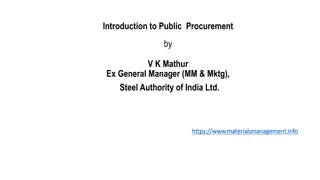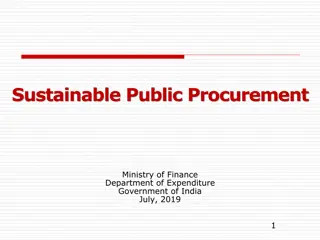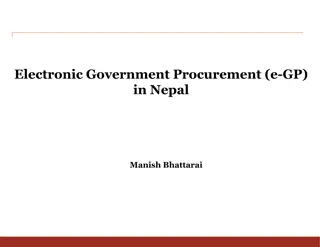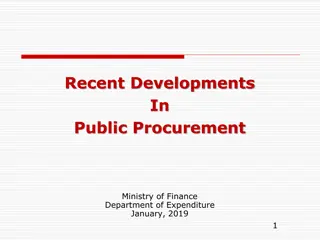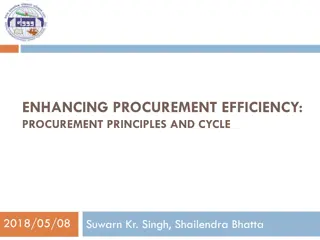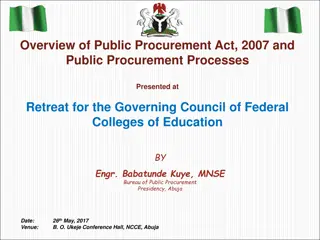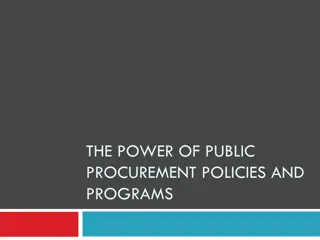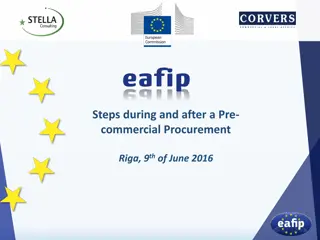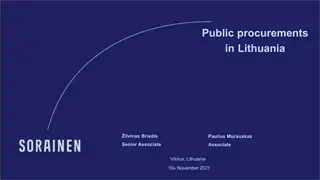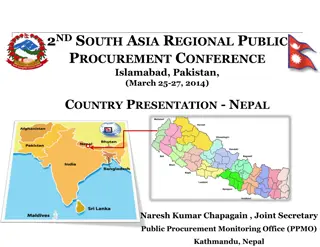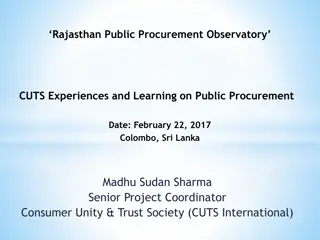The Significance of Public Procurement in Governance and Policy
Public Procurement plays a crucial role in governance by fostering open markets, but concerns about corruption have sparked debates on compliance versus discretion. A results-based focus necessitates a holistic approach to ensure the quality of public expenditure and integrity of the process. This acquisition of goods and services by government entities, amounting to a significant portion of GDP, requires adherence to principles like economy, efficiency, equal opportunity, and transparency. International competitive bidding and the development of competitive markets globally are also key aspects in this realm.
Download Presentation

Please find below an Image/Link to download the presentation.
The content on the website is provided AS IS for your information and personal use only. It may not be sold, licensed, or shared on other websites without obtaining consent from the author.If you encounter any issues during the download, it is possible that the publisher has removed the file from their server.
You are allowed to download the files provided on this website for personal or commercial use, subject to the condition that they are used lawfully. All files are the property of their respective owners.
The content on the website is provided AS IS for your information and personal use only. It may not be sold, licensed, or shared on other websites without obtaining consent from the author.
E N D
Presentation Transcript
Public Procurement: The Achilles Heel of Good Governance Jeff Gutman Senior Fellow Brookings Institution April 15, 2015
2 Key Messages 1. Public Procurement represents an important strategic instrument in the governance agenda and public policy. It has helped promote open worldwide markets. 2. Fear of corruption has led to a debate between advocates for compliance versus those that argue for more discretion. 3. A results-based focus requires a different and more holistic approach to public procurement to best serve governance concerns for the quality of public expenditure while addressing governance concerns for integrity of the process.
3 BACKGROUND
4 Background Public Procurement is the acquisition by government and related entities of goods, services, or works from an external source. 15-20% of GDP U.S. Federal Level: 500 bn / year WB: $7 billion & 100,000 contracts / year
5 Background We are all procurement experts.
6 PROCUREMENT AND AID FINANCING
7 Principles of Procurement Economy and Efficiency Equal opportunity to compete Domestic contracting Transparency
8 Procurement and Aid Financing 1. International Competitive Bidding 2. National Competitive Bidding
9 Procurement and Aid Financing Development of a worldwide competitive market
10 Top 10 Suppliers for Foreign Procurement (by value of contracts) 1980s 1995 2005 2013 United States United States China China Japan Japan France Italy Germany Italy Germany Spain United Kingdom Germany United Kingdom India France France Spain France Italy China Saudi Arabia United States Switzerland United Kingdom Austria Denmark Canada Korea, Rep. India Turkey Netherlands Spain Singapore Venezuela, RB Korea, Rep. Norway Malaysia Sweden Sources: World Bank Annual Report 1985; World Bank Borrower Procurement Reports
11 # of ICB Contracts by Supplier Country 1995 Source: World Bank Annual Procurement Reports excluding Consultant Services & Non-Consultant
12 # of Contracts by Supplier Country 2013 Source: World Bank Annual Procurement Reports excluding Consultant Services & Non-Consultant
13 Procurement and Aid Financing Impact on Local Industry Stages of Development Serving small local market Competing for ICB within country Competing regionally Competing globally
14 Procurement and Aid Financing Impact on Local Industry Share of Regionally Supplied Civil Works East Asia and Pacific 97% Europe 93 Latin America 91 Middle East & N 83 South Asia 83 Sub-Saharan Africa 56 Source: Gutman and Zhang (2015, forthcoming)
15 THE COMPLIANCE VERSUS DISCRETION DEBATE
16 The Compliance v. Discretion Debate Stylized Formula C = M + D A C: Corruption M: Monopoly D: Discretion A: Accountability Source: Klitgaard (1998)
17 The Compliance v. Discretion Debate The Case for Compliance Clarity of process and criteria essential Worldwide perception of substantial corruption EU Report OECD Report Developing countries weak institutions Zero Tolerance
18 The Compliance v. Discretion Debate The Case for Discretion Role of professional judgment and adaptability Excessive role of the contract officer Risk-averse culture Innovation and creative solutions Value-for-Money versus Price-only criteria Horizontal objectives
19 TOWARDS A PRACTICAL RESOLUTION
20 Towards a Practical Resolution What needs to be done 1. It is crucial that we look at development effectiveness of procurement in terms of the actual project or contract outcomes/results
21 Frequency of Procurement Topics Raised During World Bank Consultations Source: World Bank Procurement Policy Review: Feedback from Consultations with External Stakeholders
22 Towards a Practical Resolution What needs to be done 1. It is crucial that we look at development effectiveness of procurement in terms of the actual project or contract outcomes/results 2. If the focus is on final outcomes, then the focus must be on the whole procurement cycle from design, to bid/award to contract management/implementation
23 Stages of the Procurement Cycle
24 Towards a Practical Resolution What needs to be done 1. It is crucial that we look at development effectiveness of procurement in terms of the actual project or contract outcomes/results If the focus is on final outcomes, then the focus must be on the whole procurement cycle from design, to bid/award to contract management/implementation 2. 3. Looking at the whole procurement cycle and the Klitgaard corruption model, identify the risks of each stage
25 C = M + D A C: Corruption M: Monopoly D: Discretion A: Accountability Source: Klitgaard (1998)
26 Towards a Practical Resolution What needs to be done 1. It is crucial that we look at development effectiveness of procurement in terms of the actual project or contract outcomes/results If the focus is on final outcomes, then the focus must be on the whole procurement cycle from design, to bid/award to contract management/implementation Looking at the whole procurement cycle and the Klitgaard corruption model, identify the risks of each stage 2. 3. 4. A key factor in ensuring credible use of discretion is for public policy professionals to better understand procurement as a public policy strategy instrument
27 One man s red tape may be another s treasured safeguard Herbert Kaufman
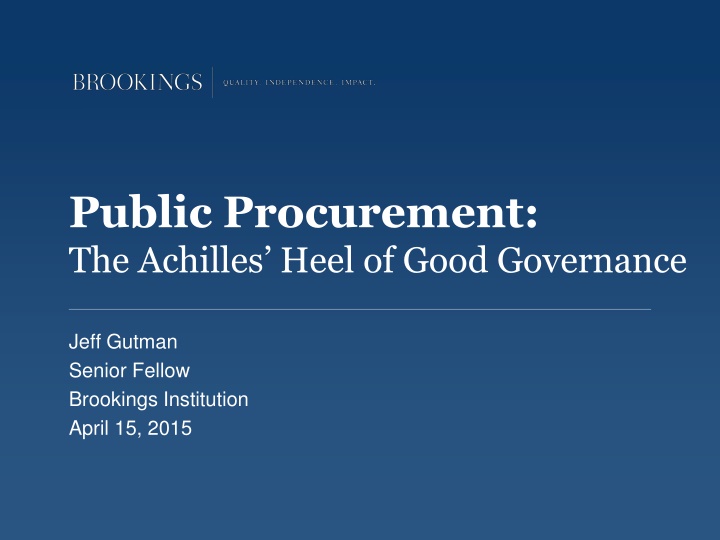




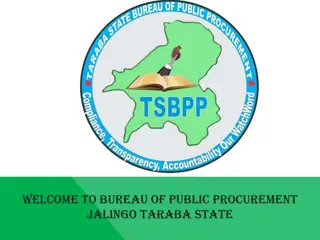
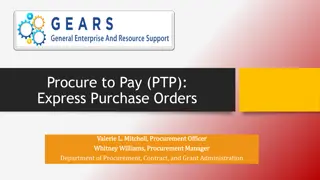
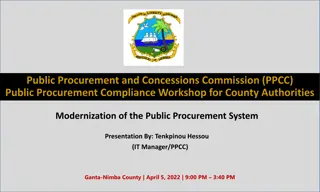
![Comprehensive Overview of Corruption Watch Submission on Public Procurement Bill [B18B-2023]](/thumb/138344/comprehensive-overview-of-corruption-watch-submission-on-public-procurement-bill-b18b-2023.jpg)
